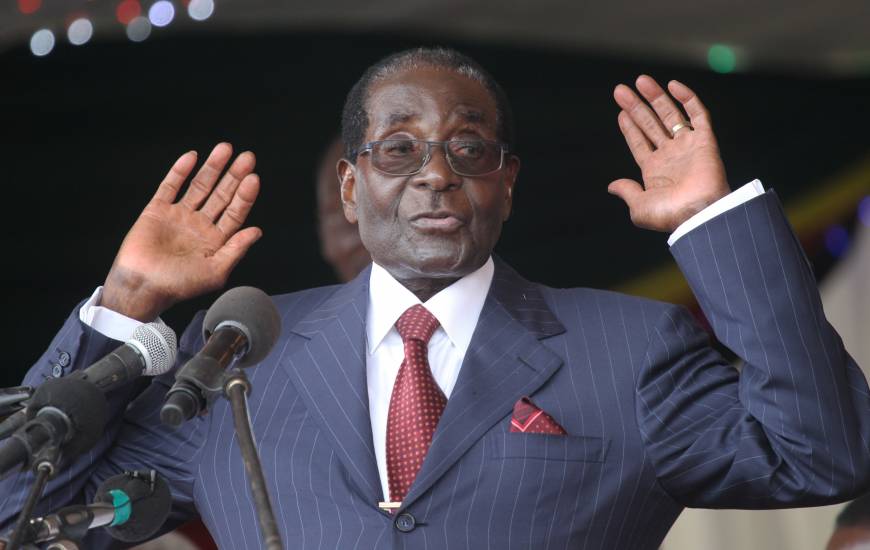Zimbabwe’s founding father and pan-Africanist Dr Robert Gabriel Mugabe has gone the way of all mortals. The final whistle was heard on Thursday (Friday, in some countries) in Singapore where he had been travelling to regularly for age-related illnesses.
Born on February 21, 1924, the long-serving president ruled Zimbabwe for nearly four decades, before he was forced out in a military coup in November 2017.
Leaders across the world have been paying tributes to Zimbabwe’s strong leader to whom many quotable quotes (mostly against white imperialism) have been attributed. The mixed reactions to his death reflect his controversial legacy.
Zimbabwe’s current president Emmerson Mnangagwa said in a statement posted to Twitter: “It is with the utmost sadness that I announce the passing on of Zimbabwe’s founding father and former President, Cde Robert Mugabe.
“Cde Mugabe was an icon of liberation, a pan-Africanist who dedicated his life to the emancipation and empowerment of his people. His contribution to the history of our nation and continent will never be forgotten. May his soul rest in eternal peace.”
Born in what was then Rhodesia, Mugabe went on to co-found a resistance movement against British colonial rule, and was jailed for 10 years between 1964 and 1974.
Nelson Chamisa, leader of Zimbabwe’s opposition Movement for Democratic Change (MDC) party, tweeted: “My condolences to the Mugabe family and Africa for the passing on of Zimbabwe’s founding President. This is a dark moment for the family because a giant among them has fallen. May the Lord comfort them.
“Even though I and our party, the MDC, and the Zimbabwean people had great political differences with the late former President during his tenure in office, and disagreed for decades, we recognise his contribution made during his lifetime as a nation’s founding President.
“There’s so much to say for a life of 95 years and national leadership spanning over 37 years but in the true spirit of Ubuntu, we would like to give this moment to mourning but there will be time for greater reflection.”
Kenyan president Uhuru Kenyatta said: “In this moment of sorrow, my thoughts and prayers go out to his family, his relatives and the people of Zimbabwe who, for many years, he served with commitment and dedication.
“Words cannot convey the magnitude of the loss as former President Mugabe was an elder statesman, a freedom fighter and a pan-Africanist who played a major role in shaping the interests of the African continent.
“Indeed, we will remember former President Mugabe as a man of courage who was never afraid to fight for what he believed in even when it was not popular.”
South Africa’s leading party, the African National Congress, tweeted that it mourned the passing of “friend, statesman and revolutionary comrade Robert Mugabe”.
Zambian president Edgar Lungu remembered Mugabe as a hero, tweeting: “I am saddened at the passing of a pan-Africanist and Zimbabwe’s founding father, Cde Robert Mugabe. He will be remembered for his fight for Africa’s liberation and fearlessly defending the continent. His place in the annals of Africa’s history is assured. We mourn with Zimbabwe.”
But former Africa minister and anti-apartheid campaigner Lord Hain said Mugabe had turned from being a “brave liberation hero” into a ruthless dictator who squandered Zimbabwe’s potential.
He added that Mugabe’s legacy would be “very two-sided”, with the early promise of his leadership outweighed by the “corrupt, repressive, dictatorial” approach he adopted.
“He is a tragic case study of a liberation hero who then betrayed every one of the values of the freedom struggle,” the Labour peer said. “On the one hand – brave liberation hero who suffered imprisonment and torture and whom anti-apartheid activists like myself at the time were thrilled to see elected in a landslide in early 1980 with a promise to build a new, non-racial Zimbabwe which respected everybody and brought all races together and somebody who liberated his country from minority, white racist rule under Ian Smith and the old Rhodesia.
“That will be the positive memory.
“But the overwhelmingly negative memory that everybody will have I think is of that liberation hero who was a case study of the leader who betrayed all the values of the freedom struggle and became corrupt, repressive, dictatorial, self-serving and ruthless in eliminating opposition and becoming increasingly interested in enriching himself and impoverishing his own people.”
Zimbabwean opposition senator and human rights lawyer David Coltart said on Twitter: “He was a colossus on the Zimbabwean stage & his enduring positive legacy will be his role in ending white minority rule & expanding a quality education to all Zimbabweans.”
Labour MP Kate Hoey, formerly the chairwoman of the all-party Parliamentary group on Zimbabwe and a longtime critic of Mugabe, wrote: “Mugabe brought independence to Zimbabwe and then killed in the Gukurahundi up to 80,000 of his own citizens in Matabeleland and brought his country to its knees economically.
“A hero to a brutal dictator.”
Mugabe once said that only God would remove him. His Creator has finally done so. He repeatedly rebuffed repeated calls to step down, insisting he would only leave office when his “revolution” was complete.
In November 2017, however, Mugabe finally came unstuck when he fired Vice President Emmerson Mnangagwa, to clear the way for his wife, Grace Mugabe, to succeed him.
A week later, Zimbabwe’s military leaders seized control, placing Mugabe under house arrest and deploying armoured vehicles to the streets of the capital, Harare. On November 21, 2017, Mugabe resigned as Zimbabwe’s president after 37 years of autocratic rule.
In his forced retirement, Mugabe was rarely seen in public; instead he spent his time between Singapore, where he received medical treatment, and his plush 25-room Blue House residence in Harare.
With agency reports











